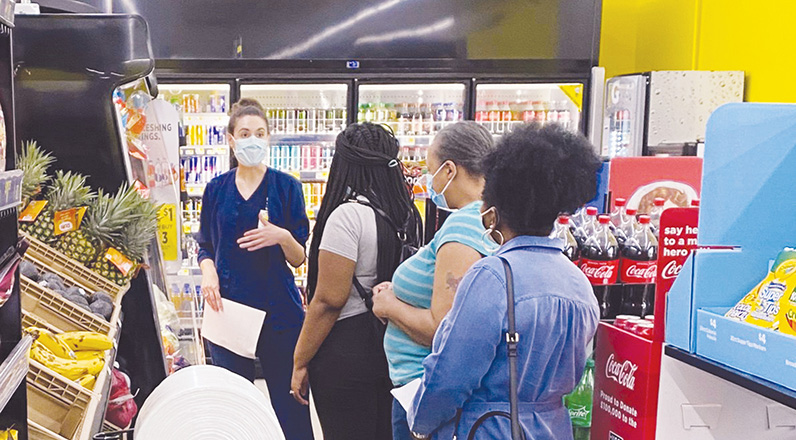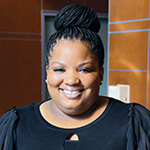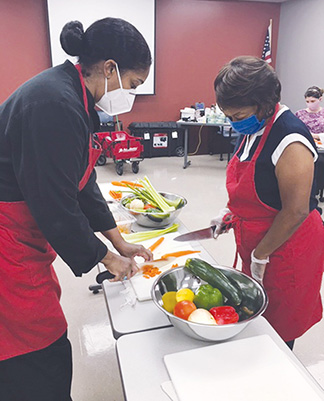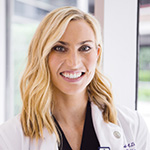
Nurse Lindsay Barleycorn leads a grocery tour at a Dollar General store with several participants of the Geaux Get Healthy Clinical Program, based at Our Lady of the Lake Health in Baton Rouge, Louisiana. The tour is part of the eight-week program that the system offers to people who are food insecure.
Stephanie Joseph enthusiastically lists the new things she's learned during her classes with the Geaux Get Healthy Clinical Program.
Instead of sipping her usual morning Coca-Cola or downing her medications with juice, she drinks cold water with a slice of lemon. Instead of buying tuna in cans packed in oil, which she loved, she buys tuna packed in water. Instead of premade lasagna high in sodium, she makes a healthier version with ground turkey. She eats more vegetables and fruits than meats.
"Before, I just ate what I want," says Joseph, 60, who has diabetes and kidney disease. "I don't eat what I want now, but I pay attention."
The clinical program is based at Our Lady of the Lake Health in Baton Rouge, Louisiana, part of Franciscan Missionaries of Our Lady Health System. Clinicians and community health workers screen patients and community members for food insecurity and enroll those who are interested in the eight-week program. It includes hands-on cooking classes, a grocery store tour, nutrition education and access to other resources and support.

Antrice Johnson, a community health worker, taught Joseph's class. She says there are many reasons people don't eat as healthily as they should. For instance, they may not have easy access to nutritious foods, or they may have never tried some healthy foods that are available.
"We just try to get them to break tradition, because a lot of people cook the way they cook because that's what they grew up on," she says.
Some, for example, have never thought of adding jalapenos instead of salt to chili to make it healthier and still give it flavor —something she has done since she started teaching classes about a year ago.
Farm friends
The clinical program is part of a broader initiative across the city — collectively called Geaux Get Healthy — that includes more than a dozen organizations collaborating to make fresh food affordable and accessible and to provide education and resources to move community members to better health. Geaux Get Healthy partners include Baton Roots Community Farm, a four-acre urban farm with about 30 associated urban gardens; Top Box Foods, which provides fresh food delivery; Three O'Clock Project, which provides out-of-schooltime meals; and YMCA of the Capital Area.

This coalition started in 2018 as a project of HealthyBR, a nonprofit housed within the Baton Rouge mayor-president's office. HealthyBR's priorities include behavioral health, healthy living, maternal and infant health, violence prevention, health equity and racial disparities, sexually transmitted diseases, HIV and hepatitis C. More than 150 organizations are now part of the effort.
Last year, the Geaux Get Healthy Clinical Program received a $100,000 grant from Healthy Blue Louisiana, a Medicaid managed health care provider.
Path to healthy outcomes
Kelli Rogers, project manager for Geaux Get Healthy, calls the partnership with Our Lady of the Lake Health "huge."
"Anytime that you can connect somebody's access to care with an organization or hospital, being able to touch all of those social determinants, you're really looking at much better health outcomes rather than, oh, here, let me give you a food box," she says.
Evidence supports that it takes behavior changes such as learning how to cook and eat differently and having support to manage a chronic disease to make real improvements in food insecurity, Rogers says.
The Geaux Get Healthy Clinical Program started in 2020. It is offered regularly at Our Lady of the Lake North and Our Lady of the Lake Silverside clinics in Baton Rouge. As of this summer, just over 1,000 people had been screened for food insecurity, answering questions about whether they have enough money for food, if they feel like they have cut back on healthy food because they can't afford it, and if they have access to healthy foods. Of those screened, 754 were eligible for the clinical program and 433 enrolled.

Meeting people where they are
Program Director Dr. Tiffany Wesley Ardoin says when she was in residency, she counseled her patients on healthy eating, but many didn't follow her advice. That's how she got more interested in food insecurity — which the Department of Agriculture defines as a lack of access to enough food for an active, healthy life for all household members.
"I found that this was a big problem with my patients," she says.
About 9% of Americans and 16% of Louisiana residents deal with food insecurity. That number is 14% in East Baton Rouge Parish, where the clinics are located, according to a 2021 community health needs assessment. Of those in the parish who are food insecure, about 33% do not qualify for most federal nutrition programs.
Ardoin points out that clinical care only determines about 20% of a patient's overall health, with the remaining 80% determined by factors such as healthy foods and the patient's overall environment. "It's fantastic to see a clinic-based approach to really bridge that gap between the hospital system and community-based organizations to promote health within our community," she says.
Most participants in the clinical program are middle-aged women who have attained no more than a high school education or GED, and have a household income of less than $25,000, says Ardoin. Most of those who sign up are obese and have high blood pressure and diabetes or prediabetes.
Classes and a grocery store tour
The Geaux Get Healthy classes use the American Heart Association's Healthy for Life curriculum. Participants get a free box of fresh food, such as vegetables, fruit and meat, from Top Box Foods. They also get a tour of a grocery store with a dietician. The Our Lady of the Lake North campus is next door to a Dollar General store that sells fresh produce.
In 2020, after the mayor invited Dollar General to collaborate in HealthyBR, the company remodeled two stores in Baton Rouge to stock fresh produce. There are now nine Dollar General stores in the city that carry fresh produce and nearly 3,900 stores that now carry it nationwide.
Johnson, the instructor, says reading food labels can be eye-opening for people in the program. Even she was surprised to learn on the Dollar General tour that a package of ramen noodles or a Totino's party pizza each has two high-sodium servings.
Ardoin calls the tours valuable. "That is really meeting people where they are and encouraging them to shop healthier and choose healthier options," she says.
Making changes
The program is getting some encouraging results. According to findings from one study published in October, 57 enrollees were surveyed and the mean food insecurity scores improved upon completion of the program and six months afterwards.
Ardoin says she has heard other feedback about the program: that it has gotten some participants out of deep depression, that many have lost weight and been able to stop taking blood pressure and diabetes medications, and that it helped improve one woman's relationship with her teenage son because they started cooking and working out together.
"Many of our participants talk about how they spread this education into the community," she says. "That education is very powerful coming from our community members, not necessarily from us."
Johnson teaches participants how to make a healthier version of a banana split with Greek yogurt and homemade chocolate sauce. She said one participant now makes the treat with her grandchildren. Children who tag along to class try new foods. "You want to start them young," she says. "The younger they are that they start, the better they have a chance of growing up to be healthy adults, right?"
Joseph, who took the classes this summer, has been able to decrease some medications and is at a healthier weight. She enjoyed getting out of her house, where she lives alone, to attend class. The program provides transportation.
Joseph doesn't live near a grocery store and doesn't own a car. She relies on neighbors or her daughter to get her groceries. She points out that healthier foods are often more expensive. Nevertheless, she's determined to keep her healthier eating habits, and she encourages others to sign up for the program.
"It's a good program to be in, and they can join, and they are going to love it like me," she says.
